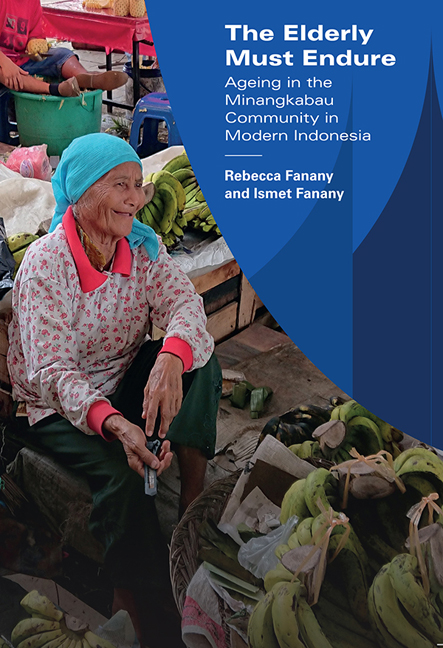Book contents
- Frontmatter
- Contents
- Acknowledgements
- Map of Indonesia
- Map of West Sumatra
- Map of the Village of Koto
- Aminah's Family Tree
- 1 Introduction
- 2 Ageing in the Past and Present
- 3 Adat Traditions and the Elderly
- 4 Religion and the Elderly
- 5 Language and the Elderly
- 6 Ageing in the Village
- 7 Ageing in Padang
- 8 Ageing in the Rantau
- 9 Ageing in an Institution
- 10 Ageing and Cultural Consonance
- 11 The Elderly Must Endure
- Afterword
- References
- Index
- About the Authors
9 - Ageing in an Institution
Published online by Cambridge University Press: 16 May 2019
- Frontmatter
- Contents
- Acknowledgements
- Map of Indonesia
- Map of West Sumatra
- Map of the Village of Koto
- Aminah's Family Tree
- 1 Introduction
- 2 Ageing in the Past and Present
- 3 Adat Traditions and the Elderly
- 4 Religion and the Elderly
- 5 Language and the Elderly
- 6 Ageing in the Village
- 7 Ageing in Padang
- 8 Ageing in the Rantau
- 9 Ageing in an Institution
- 10 Ageing and Cultural Consonance
- 11 The Elderly Must Endure
- Afterword
- References
- Index
- About the Authors
Summary
OLDER MINANGKABAU IN INSTITUTIONALIZED CARE
For more than thirty years, the Ministry of Social Affairs has run old age homes around Indonesia that provide room and board for older people who have no family or the means to support themselves independently. Care at one of these institutions is completely free to the residents, and provision is made for the complex health care needs many older people will develop late in life. Generally, however, an individual must be able to care for him or herself at the time of admission. These public institutions are generally referred to as Panti Sosial Tresna Werdha (PSTW). The term tresna werdha is Javanese and means “love of old people”. Panti sosial is Indonesian and refers to any type of social facility, such as a nursing home, orphanage, or other similar residential institution. In addition to these public facilities, privately run nursing homes for older people have been established by a number of hospitals and organizations. These facilities require payment, although some do accept residents who cannot pay.
In West Sumatra, the two largest old age facilities are Panti Sosial Tresna Werdha Sabai nan Aluih which is located in the town of Sicincin, not far from Padang, and Panti Sosial Tresna Werdha Kasih Sayang Ibu, in the town of Batusangkar in the highland interior of the province. The names chosen for the two facilities are interesting in that they have specific connotations that are meaningful in the context of their function. The PSTW located in Sicincin is in the traditional rantau. The name Sabai nan Aluih is a reference to a character in a well-known Minangkabau folk tale, who is portrayed as the epitome of a dutiful and loyal daughter who loves and respects her parents. The character represents the exemplary child. By contrast, the facility in Batusangkar, which is in the Minangkabau heartland, uses an Indonesian name that means “mother's love”. Both names are intended to convey the idea of affection between family members and refer to an idealized relationship between parents and children. These two facilities can accommodate 110 and 70 people respectively and account for 75 per cent of the accommodation for elderly people in need in the province. Both facilities are currently full to capacity and are approached by individuals with no place to live or families seeking accommodation for an older relative on a weekly basis.
- Type
- Chapter
- Information
- The Elderly Must EndureAgeing in the Minangkabau Community in Modern Indonesia, pp. 201 - 224Publisher: ISEAS–Yusof Ishak InstitutePrint publication year: 2018



